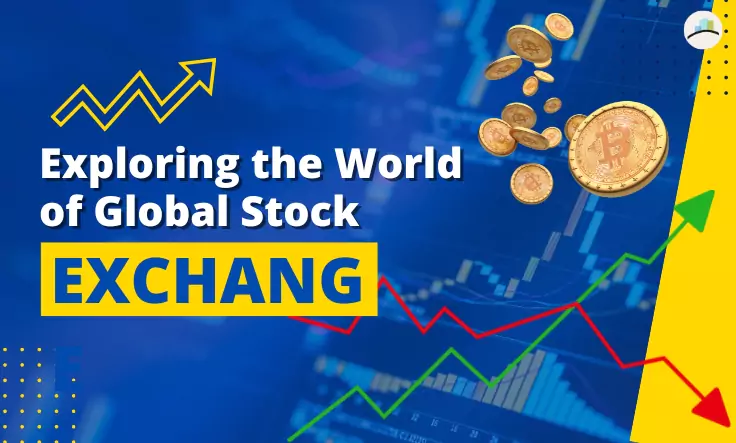Investing in the stock market means buying and selling parts of companies that are listed for public trading all around the world.
This helps people and businesses to grow their money over time.
The stock market is like a big marketplace where people can trade these company shares.
When people buy shares, they're investing in the success of those companies.
As the companies do well, the value of their shares usually goes up, which means investors can make money.
It's a way for individuals and organizations to increase their wealth over time by taking advantage of the ups and downs of the economy.
Introduction to the Global Stock Exchange
The global stock exchange is like a giant store where people buy and sell different kinds of investments, like stocks and bonds.
It's really important because it helps companies raise money and allows regular folks like you and me to own a piece of those companies.
Think of it like a big scale that tells us how well the economy is doing and what people think about investing.
So, when you hear about the stock market going up or down, it's like a signal telling us how things are going in the business world.
History of Stock Exchanges
Stock exchanges have been around since ancient times when merchants would come together to exchange shares of their businesses.
These early gatherings laid the foundation for more formalized stock exchanges that emerged later on.
One notable example is the Amsterdam Stock Exchange, which was established in 1602, followed by the London Stock Exchange in 1801.
These early exchanges provided a platform for traders to buy and sell stocks, bonds, and other securities, setting the stage for the development of the modern global stock market.
Over time, stock exchanges have evolved to become sophisticated financial institutions, playing a crucial role in the economy by facilitating investment, capital formation, and the allocation of resources.
Today, stock exchanges operate around the world, connecting investors and companies in a complex network of trading and investment activity.
Major Stock Exchanges Around the World
- New York Stock Exchange (NYSE): One of the world's largest stock exchanges located in New York City, USA.
It is known for trading a wide range of securities including stocks, bonds, and exchange-traded funds (ETFs).
Many prominent American and international companies are listed on the NYSE.
- Nasdaq: Another major stock exchange in the United States, headquartered in New York City.
Nasdaq is known for its focus on technology and innovation companies.
It is home to many tech giants like Apple, Google (Alphabet), Microsoft, and Amazon.
- London Stock Exchange (LSE): The primary stock exchange in the United Kingdom, located in London.
It is one of the oldest stock exchanges in the world, tracing its roots back to the late 17th century.
The LSE facilitates the trading of stocks, bonds, derivatives, and other financial instruments.
- Tokyo Stock Exchange (TSE): The largest stock exchange in Japan, located in Tokyo.
It plays a crucial role in the Japanese economy and is known for its significant trading volume in Asian markets.
The TSE lists a wide range of Japanese and international companies.
- Shanghai Stock Exchange (SSE): One of the two stock exchanges in mainland China, located in Shanghai.
It is one of the largest stock exchanges in the world by market capitalization.
The SSE primarily facilitates the trading of Chinese A-shares, which are shares of mainland China-based companies.
Functions and Operations of Stock Exchanges
Stock exchanges are like big markets where people can buy and sell things called securities, which are investments like stocks and bonds.
These exchanges help figure out the prices of these securities, match up buyers with sellers, and make sure trades happen smoothly.
They also set rules for what securities can be listed for trading and make sure everyone follows the rules so that the market is fair and works properly.
Participants in Stock Exchanges
In stock exchanges, different types of people take part. First, there are investors. They're folks who buy and sell stocks and stuff like that.
Some do it to keep their money safe for a long time, while others do it for quick buying and selling.
Then, there are brokers. They're like the middlemen. They help people buy and sell stocks by doing the actual transactions for them.
Finally, there are market makers. They're the ones who keep the market flowing smoothly.
They offer to buy and sell stocks regularly, which makes it easier for everyone else to buy or sell whenever they want.
So, investors, traders, brokers, and market makers all play different roles in the stock market.
Listing Requirements and Regulations
|
Listing Requirements and Regulations |
United States |
United Kingdom |
|
Regulatory Body |
Securities and Exchange Commission (SEC) |
Financial Conduct Authority (FCA) |
|
Purpose |
Ensure financial stability and transparency |
Ensure financial stability and transparency |
|
Criteria |
- Financial stability |
- Financial stability |
|
|
- Good governance |
- Good governance |
|
|
- Transparency in operations |
- Transparency in operations |
|
|
- Compliance with disclosure requirements |
- Compliance with disclosure requirements |
|
Enforcement |
SEC enforces regulations in the US |
FCA enforces regulations in the UK |
|
Oversight |
Monitors listed companies' compliance |
Monitors listed companies' compliance |
|
|
Conducts investigations and penalties |
Conducts investigations and penalties |
|
Reporting Standards |
Generally Accepted Accounting Principles (GAAP) |
International Financial Reporting Standards (IFRS) |
|
|
Securities Act of 1933 |
Financial Services and Markets Act 2000 (FSMA) |
|
|
Securities Exchange Act of 1934 |
Listing Rules of the London Stock Exchange |
Stock Market Indices
Stock market indices are like big signposts that show how a bunch of stocks are doing together.
Imagine you have a group of friends, and you want to know how happy they all are.
Instead of asking each friend individually, you could just look at one friend who represents them all.
That's what stock market indices do—they pick a bunch of stocks that represent a certain market or type of business, like big companies in the US, the UK, or Japan.
People use these indices to get an idea of how well the overall economy is doing.
It's like taking the temperature of the stock market to see if it's hot, cold, or just right.
Market Volatility and Factors Affecting Stock Prices
Stock markets go up and down because of many things like how the economy is doing, what's happening in the world, and how people feel about investing.
When the economy is doing well, with things like more jobs or prices staying steady, stock prices tend to go up.
But if there are problems like wars or natural disasters, or if people get worried about the future, stock prices can drop.
So, economic numbers like how much the country is making (GDP), how prices are changing (inflation), and how many people are working all play a part in what happens in the stock market.
Also, things like wars, natural disasters, or sudden events can shake up how investors feel, causing the market to be less stable.
Globalization and Interconnectedness of Stock Markets
Globalization means that financial markets all around the world are becoming more connected.
This means that what happens in one country's stock market can affect stock markets in other countries too.
For example, if there's a big economic event or trend globally, it can cause ripples in stock markets everywhere.
This shows why it's important for investors to spread their money across different countries' markets, so if one market goes down, they don't lose everything.
Also, big companies that operate in many countries play a part in connecting these markets even more because they move money between different places.
So, the world's stock markets are becoming more and more linked together because of globalization.
Technological Advancements in Stock Trading
Technological advancements have changed how people trade stocks.
Now, we have electronic trading platforms and fancy algorithms doing a lot of the work.
These changes make the market work better, cost less to do transactions, and make it easier to buy and sell stocks.
But, there are worries too. Some people are concerned that these new ways of trading might be used to manipulate the market, and there could be bigger risks because of all the automated trading.
Risks and Challenges in the Global Stock Exchange
Investing in the global stock market can offer chances to make money, but it's not without its tough parts.
One big problem is how the market can suddenly change, going up and down a lot, making it harder to predict what will happen to your investments.
Some rules and laws can change, and these changes affect how much money you make from your investments.
Plus, things like wars or political issues worldwide can also shake up the market. And then there are really big problems, like when there's a financial crisis, which can hurt everyone's investments.
So, while there's a lot of potential to earn money, there are also a lot of risks that investors need to be aware of and ready to deal with.
Importance of Diversification in Stock Investments
Diversification means not putting all your eggs in one basket when you invest in stocks.
It's like having a bunch of different kinds of fruits in your basket instead of just apples.
By spreading your money out over different types of stocks, industries, and places around the world, you lower the risk of losing all your money if something bad happens to one company or one part of the market.
It's like having a backup plan. So, even if one part of your investments isn't doing well, the others can still help you make money and reach your financial goals over time.
Future Trends in the Global Stock Exchange
In the future, the worldwide stock market will be influenced by new trends like artificial intelligence (AI), blockchain technology, and sustainable investing.
AI helps people make better choices about investments and manage risks by using smart computer programs.
Blockchain makes transactions safer and more open by keeping records in a secure digital ledger.
Sustainable investing is about caring for the environment, society, and how companies are run (ESG factors).
These trends will likely shape how people invest and trade stocks globally.
Impact of Global Events on Stock Markets
When big things happen all around the world, like sickness outbreaks, fights between countries, or when economies are struggling, it shakes up the stock markets.
Take the COVID-19 pandemic, for instance—it made stock prices go up and down a lot and messed up businesses everywhere.
When countries argue or have problems trading with each other, it makes investors nervous about what might happen next, so they're not sure if they should buy or sell stocks.
All these events make it hard to predict what will happen to the value of stocks, and that uncertainty makes investors feel unsure about what to do with their money.
FAQs
What is the purpose of a stock exchange?
A stock exchange facilitates the buying and selling of securities, enabling companies to raise capital and investors to trade shares.
How do stock market indices work?
Stock market indices track the performance of a group of stocks, providing insights into market trends and investor sentiment.
What factors influence stock prices?
Stock prices are influenced by various factors, including economic indicators, geopolitical events, and investor sentiment.
Why is diversification important in stock investments?
Diversification helps spread risk across different assets, reducing the impact of market volatility and specific company performance.
What are some future trends in the global stock exchange?
Future trends include advancements in technology, such as AI and blockchain, as well as a focus on sustainable investing and ESG factors.
Conclusion:
In short, the global stock exchange is like a busy marketplace where people who invest money and companies come together to decide where to put their money and hopefully make more money in return.
It's important to learn how the stock market works, what it does, and what risks are involved if you want to be successful in investing.
By keeping up with what's happening, spreading out where you put your money, and planning to invest for a long time, both regular people and big companies can take advantage of what the global stock exchange offers while also being careful about the risks involved.











 1,499
1,499
